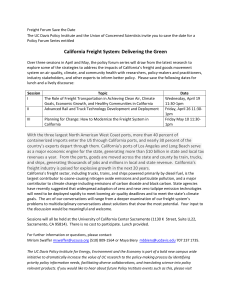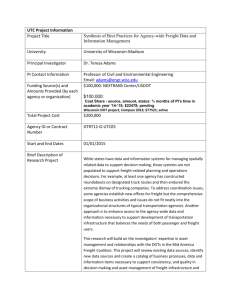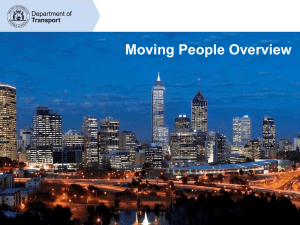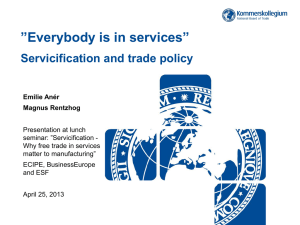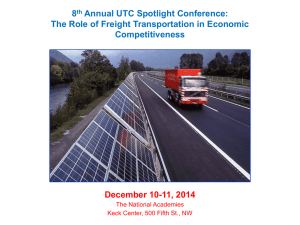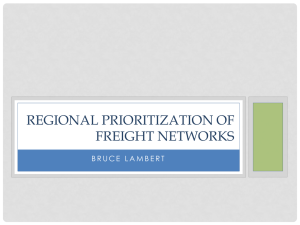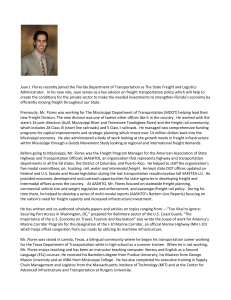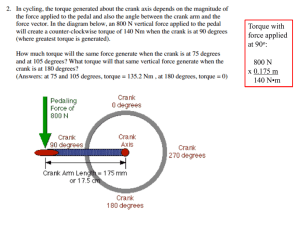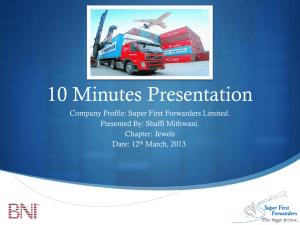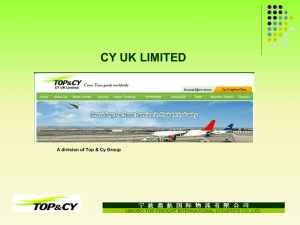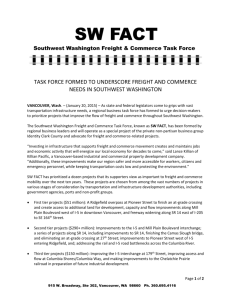SMARTSET Project fact sheet
advertisement
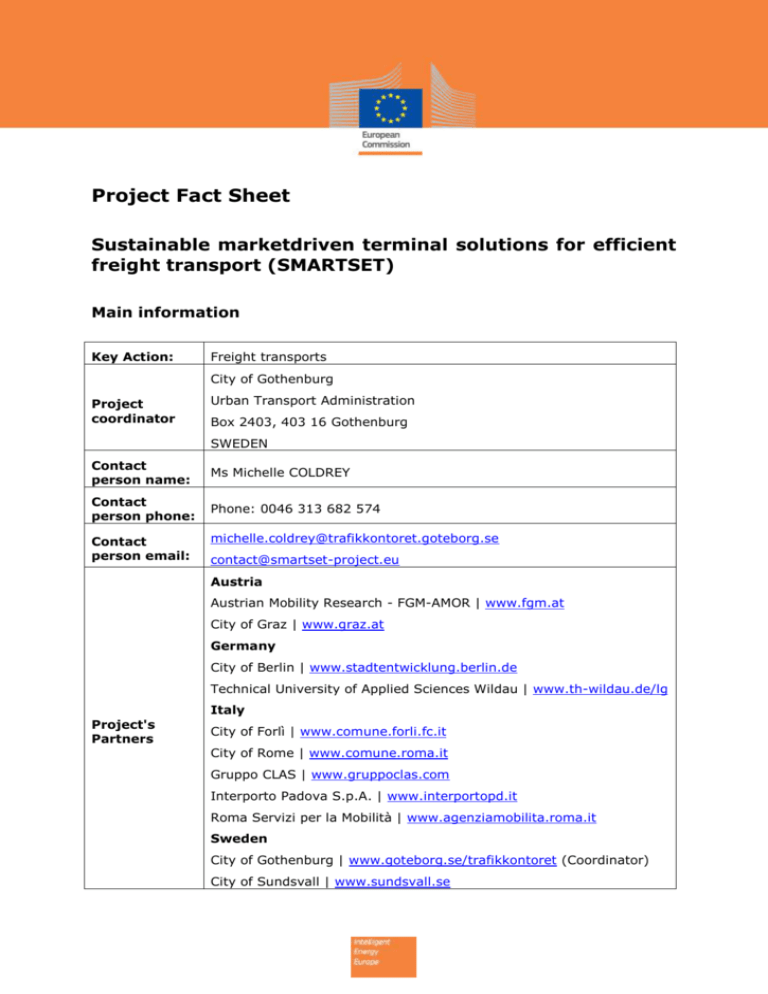
Project Fact Sheet Sustainable marketdriven terminal solutions for efficient freight transport (SMARTSET) Main information Key Action: Freight transports City of Gothenburg Project coordinator Urban Transport Administration Box 2403, 403 16 Gothenburg SWEDEN Contact person name: Ms Michelle COLDREY Contact person phone: Phone: 0046 313 682 574 Contact person email: michelle.coldrey@trafikkontoret.goteborg.se contact@smartset-project.eu Austria Austrian Mobility Research - FGM-AMOR | www.fgm.at City of Graz | www.graz.at Germany City of Berlin | www.stadtentwicklung.berlin.de Technical University of Applied Sciences Wildau | www.th-wildau.de/lg Italy Project's Partners City of Forlì | www.comune.forli.fc.it City of Rome | www.comune.roma.it Gruppo CLAS | www.gruppoclas.com Interporto Padova S.p.A. | www.interportopd.it Roma Servizi per la Mobilità | www.agenziamobilita.roma.it Sweden City of Gothenburg | www.goteborg.se/trafikkontoret (Coordinator) City of Sundsvall | www.sundsvall.se Swedish Transport Administration | www.trafikverket.se Trivector Traffic AB | www.trivector.se United Kingdom Newcastle University | www.ncl.ac.uk/newrail Project's website: www.smartset-project.eu Benefits: SMARTSET helps to improve the attractiveness of terminals and to reduce the energy consumption of freight transport in cities and facilitates the EU’s 2020 strategy. Keywords: urban freight transport, city terminals, long distance transport, last mile distribution, city centre, market based solutions for terminals, reduce congestion and energy consumption, cooperative business models, regulations and incentives, energy-efficient vehicles Duration: 01/05/2013 – 30/04/2016 Budget: 2.3 million Euro (EU contribution 75%) Contract number: IEE/12/714/SI2.644747 Summary The demand for urban freight transport has increased due to the concentration of the population in urban areas and as the majority of the industrial production is delivered there. Cities and regions must also deal with an increasing specialization of the urban and economic system, with a global division of production and its associated freight. Transport of goods, both over long distances and within cities, contributes a substantial part of the total emissions generated from the transport sector, as well as congestion. In urban areas up to 20 % of traffic, 30 % of street occupation and 50 % of greenhousegas emissions are generated by freight. A lot of transport operations start or finish in an urban area. More than 50 % of freight tonnes transported by road in Europe are carried for a distance of less than 50 kilometres. To tackle this challenge, the SMARTSET project develops and shows how freight transport in urban areas can be made more energy-efficient and sustainable by a better use of freight terminals. To achieve this, the project provides examples of good practice supporting cities, regions and countries to contribute to the European Union “20-20-20” targets: reducing greenhouse gas emissions by 20 %, increasing the share of renewables in energy consumption to 20 % and improving energy efficiency by 20 %, all by 2020. SMARTSET’s approach: SMARTSET creates a cost effective solution and a sustainable business model for combined consolidation and zero-emission distribution of goods. SMARTSET increases the update of cleaner and energy-efficient vehicles for deliveries to and within cities. SMARTSET develops incentives and restrictions to stimulate cleaner and energyefficient distribution. 2 Project’s results Result 1 Creating cost effective solutions and sustainable business models for combined consolidation and zero-emission distribution of goods Result 2 Demonstrating a model for zero-emission last mile distribution that can be adapted in a number of major, medium sized and small cities in Europe Result 3 Demonstrating the potential of electric-powered distribution vehicles to and within cities Result 4 Developing incentives and restrictions to stimulate consolidated distribution with electric-powered vehicles preserving and improving the quality of distribution services. Result 5 Reduction of 9,051 tonnes CO2 emissions per year Reduction of 36 GWh energy consumption per year Reduction of 3,104 tonnes energy consumption per year Reduction of 50% vehicle kilometers generated from distribution 5 terminals operating on market based conditions during the project period 8 business models for terminal schemes covering different geographical sites 3 business models for terminal schemes envisaged to be set up after the project period Lessons learnt Lesson 1 The Canvas business model as used in SMARTSET can be applied to all of the sites and provide a good way to structure thoughts about how to approach a business model. However, it is important that proper training is given as to how the model works, and the different elements involved. Operational issues are difficult to foresee from the start, and business models should be planned in order to allow a smooth resolution of them as they emerge. Lesson 2 The difference between cities having established a city logistics policy in the past vs "newcomer" cities emerged. Common objective is to make more sustainable the transport with specific focus on freight transport for every site. Quite similar solutions are adopted for freight planning in the sites, even if they are characterized by the dimension of the site itself and by a sort of national approaches. Lesson 3 Networking at local level requires a lot of time, and different approaches, and this should not be underestimated, notably for application sites that start from scratch. The same holds true for National Networks: While in a country like Sweden, there are already operational National Networks, countries like Austria and Germany have to start establishing one. Last updated 10/06/2015 3
